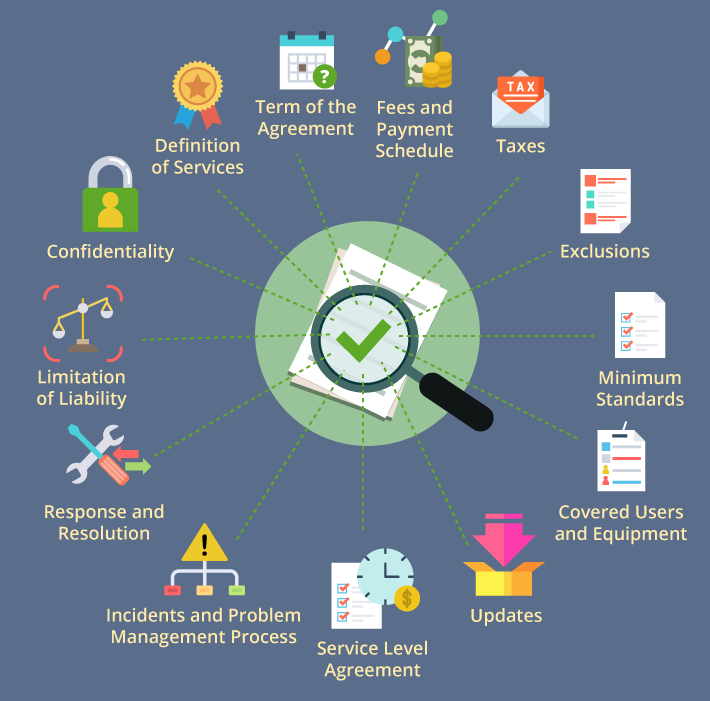Introduction to IT Service Agreements
An IT Service Agreement, also known as an IT Service Contract, is a legally binding document that outlines the terms and conditions governing the provision of IT services by a service provider to a client in England and Wales. This guide provides a comprehensive overview of key components, legal considerations, and best practices when drafting and executing an IT Service Agreement in accordance with UK laws.

Key Components of an IT Service Agreement
- Parties Involved: Clearly identify the parties entering into the agreement, including the service provider (often referred to as the “Supplier”) and the client (referred to as the “Customer”).
- Scope of Services: Define the IT services to be provided, including descriptions of deliverables, service levels, and performance metrics. Specify any exclusions or limitations to the services.
- Service Fees and Payment Terms: Outline the fees for the IT services, payment schedules, invoicing procedures, and any penalties for late payments. Include provisions for additional charges for out-of-scope work.
- Service Level Agreements (SLAs): Establish SLAs detailing the expected level of service, response times, uptime guarantees, and procedures for reporting and resolving service issues or disruptions.
- Intellectual Property Rights: Clarify ownership of intellectual property rights, including any software, code, or proprietary technologies developed or provided as part of the services.
- Confidentiality and Data Protection: Include provisions for maintaining the confidentiality of client information and compliance with data protection laws, such as the General Data Protection Regulation (GDPR).
- Termination and Renewal: Define the circumstances under which either party may terminate the agreement, including notice periods and obligations upon termination. Address provisions for contract renewal and renegotiation.
- Liability and Indemnity: Allocate risks and liabilities between the parties, including limitations of liability, indemnification obligations, and insurance requirements.
Legal Considerations and Compliance
- Contract Law: Ensure that the IT Service Agreement complies with principles of contract law in England and Wales, including offer, acceptance, consideration, and intention to create legal relations.
- Consumer Rights: If the client is a consumer, be aware of consumer rights and protections under UK consumer law, including the Consumer Rights Act 2015.
- Data Protection: Adhere to data protection laws, including the GDPR, when handling personal data as part of the IT services. Implement appropriate data security measures and data processing agreements where necessary.
- Competition Law: Avoid anti-competitive practices and ensure compliance with competition law, including prohibitions against anti-competitive agreements and abuse of dominant market positions.
- Jurisdiction and Dispute Resolution: Specify the jurisdiction and governing law of the agreement as England and Wales. Include provisions for dispute resolution, such as arbitration or mediation, to resolve any disputes that may arise.
Best Practices for Drafting and Executing
- Clear and Concise Language: Use clear, unambiguous language to ensure mutual understanding of rights, obligations, and expectations.
- Tailored to Specific Needs: Customise the agreement to reflect the unique requirements of the parties and the nature of the IT services being provided.
- Seek Legal Advice: Consult with legal professionals experienced in contract law and IT services to ensure the agreement is legally enforceable and adequately protects the interests of both parties.
- Regular Review and Updates: Review the IT Service Agreement periodically to ensure it remains up-to-date with changes in laws, regulations, and business needs.
By following these guidelines and considerations, parties can effectively draft and execute IT Service Agreements that facilitate successful and mutually beneficial relationships between service providers and clients in England and Wales.
What is an IT Service Agreement?
An IT Service Agreement is a legally binding contract between a service provider and a client that outlines the terms and conditions of the IT services to be provided, including scope, fees, responsibilities, and other important details.
Why is an IT Service Agreement important?
An IT Service Agreement clearly defines the rights, obligations, and expectations of both parties, helping to prevent misunderstandings, disputes, and legal issues. It provides a framework for the delivery of IT services and ensures accountability.
What are the key components of an IT Service Agreement?
Key components include scope of services, fees and payment terms, service level agreements (SLAs), intellectual property rights, confidentiality and data protection provisions, termination and renewal terms, liability and indemnity clauses, and dispute resolution mechanisms.
Who typically signs an IT Service Agreement?
An IT Service Agreement is signed by both the service provider (Supplier) and the client (Customer) who are entering into the contractual relationship for the provision of IT services.
How long does an IT Service Agreement last?
The duration of an IT Service Agreement can vary and is typically specified within the contract. It may be for a fixed term, such as one year, with provisions for renewal or termination.
What happens if either party breaches the IT Service Agreement?
If either party breaches the agreement, the non-breaching party may have remedies available, such as termination of the contract, seeking damages for losses incurred, or pursuing legal action through dispute resolution mechanisms outlined in the agreement.
Can an IT Service Agreement be amended after it’s been signed?
Yes, an IT Service Agreement can be amended if both parties agree to the changes and formally execute an amendment or addendum to the original contract. It’s essential to document any modifications in writing to ensure clarity and enforceability.
What should I consider before signing an IT Service Agreement?
Before signing, carefully review all terms and conditions of the agreement, seek clarification on any ambiguous or unclear provisions, assess whether the services meet your needs, and ensure compliance with applicable laws and regulations.
Can I terminate an IT Service Agreement before the end of the contract term?
Termination provisions vary depending on the terms negotiated in the agreement. Typically, there are provisions for termination with or without cause, specifying notice periods and any associated penalties or obligations upon termination.
Do I need legal advice before signing an IT Service Agreement?
While not mandatory, seeking legal advice from a solicitor experienced in contract law and IT services can provide valuable insights, help identify potential risks, and ensure that the agreement adequately protects your interests before signing.
IT SERVICE AGREEMENT
[Service Provider Name] [Address] [City, Postcode] [Phone Number] [Email Address] (Hereinafter referred to as the “Provider”)
AND
[Client Name] [Address] [City, Postcode] [Phone Number] [Email Address] (Hereinafter referred to as the “Client”)
SERVICES
The Provider agrees to provide the following IT services to the Client:
- [Description of services]
- [Scope of work]
- [Service Level Agreements (SLAs)]
Any additional services requested by the Client will be subject to negotiation and may incur additional fees.
FEES AND PAYMENT
The Client agrees to pay the Provider the fees outlined in Schedule A for the services provided.
Payment terms: [Specify payment terms, e.g., monthly, quarterly, etc.]
Late payments may incur interest charges at [Specify interest rate]% per annum.
INTELLECTUAL PROPERTY
All intellectual property rights, including but not limited to software, code, and proprietary technologies, developed or provided by the Provider as part of the services, shall remain the property of the Provider.
CONFIDENTIALITY
The Provider and the Client agree to maintain the confidentiality of any confidential information disclosed during the course of the agreement.
TERM AND TERMINATION
This agreement shall commence on [Commencement Date] and continue until terminated by either party in accordance with the terms herein.
Either party may terminate this agreement with [Notice Period] written notice to the other party for any reason or no reason at all.
LIABILITY AND INDEMNITY
The Provider shall not be liable for any indirect, consequential, or incidental damages arising out of or in connection with the services provided under this agreement
The Client agrees to indemnify and hold harmless the Provider from any claims, damages, or liabilities arising out of the Client’s use of the services.
GOVERNING LAW AND JURISDICTION
This agreement shall be governed by and construed in accordance with the laws of England and Wales.
Any dispute arising out of or in connection with this agreement shall be subject to the exclusive jurisdiction of the courts of England and Wales.
GENERAL PROVISIONS
This agreement constitutes the entire understanding between the parties concerning the subject matter herein and supersedes all prior agreements and understandings, whether oral or written.
8.2 This agreement may be amended only in writing and signed by both parties.
IN WITNESS WHEREOF, the parties hereto have executed this agreement as of the date first above written.
[Provider Name]
By: ___________________________ [Signature]
Name: ________________________ [Printed Name]
Title: _________________________ [Title]
[Client Name]
By: ___________________________ [Signature]
Name: ________________________ [Printed Name]
Title: _________________________ [Title]
SCHEDULE A: FEES
[Outline the specific fees for the services provided, including rates and payment terms.]
- Press Release – New Product Announcement - July 19, 2024
- Blog Advertising Agreement - July 18, 2024
- Free Prize Draw Terms and Conditions - July 17, 2024









